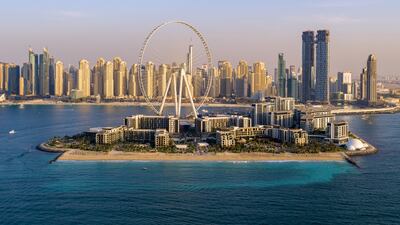Latest: Young hopeful their best days lie ahead, despite pandemic slump
Related: Pandemic brings job losses and setbacks for women
The UAE has been named as the nation young Arabs would most like to live in and have their own country emulate, for the tenth consecutive year.
Almost half of 3,400 young Arabs polled across the Middle East and North Africa for this year's ASDA’A BCW Arab Youth Survey listed the UAE as the most desirable place to live — significantly outranking the remaining four countries that made up the top five.
At least 47 per cent of respondents, aged 18 to 24, said they would want to live in the Emirates, while 19 per cent chose the US. Fifteen per cent selected Canada, while France (13 per cent) and Germany (11 per cent) completed the top five.
On Tuesday, Sheikh Mohammed bin Rashid, Vice President and Ruler of Dubai, celebrated the findings and said “the UAE is everyone's country and everyone's home. Our experience will remain available to all and our relations will remain positive with everyone".
Afshin Molavi, author and senior fellow at the Foreign Policy Institute of the Johns Hopkins University School of Advanced International Studies in Washington DC, said the UAE's lead was all the more striking “given that no other Arab country made the top five of aspirational places to live".
He described the Emirates as a “lodestar for aspiring middle classes and educated professionals".
“Young people around the world want better governance, less corruption, opportunities for education and employment, and secure and healthy environments,” he said.
“Every region also needs intense competition, and a leader of the pack. The UAE has clearly raised the bar across the region, as it has emerged as a global economic hub for trade, transport, tourism and, increasingly, technology.”
The country whose people were most keen to live in the UAE was Sudan. Sixty-six per cent of respondents there chose the Emirates over any other nation to live in. Next was Egypt, at 65 per cent. More than half of Iraqis, Saudi Arabians, Algerians and Lebanese people surveyed also chose the UAE.
Johns Hopkins University School of Advanced International Studies
Almost half (46 per cent) of the young people polled said they would like their country to emulate the Emirates — far more than the number of people who thought their home countries should work towards being more like the US (28 per cent). Canada, Germany and France completed the top five with between 11 and 12 per cent each.
A growing economy and wide range of work opportunities were chosen as the top two things young Arabs most associated with the UAE, with safety and a “clean and enjoyable environment” also ranking highly among respondents.
Despite the regional attraction of the UAE among young people, fewer said they considered emigration than in last year's survey.
A third of those polled said they had considered or wanted to emigrate, compared to 42 per cent in 2020.
The decrease in interest was across the board — in the GCC, North Africa and Levant, where desire to emigrate dropped from 63 per cent in 2020 to less than half (42 per cent) this year.
Young Sudanese citizens were the most likely to emigrate, with 68 per cent considering or actively trying to leave their country. Moroccans were the second most likely, with 56 per cent of respondents expressing interest in emigrating while Lebanon, Jordan and Syria rounded out the top five with 48 per cent, 47 per cent and 45 per cent, respectively.
Young people living in the GCC were least likely to want to leave their home country, with only 3 per cent of young Emiratis expressing an interest in leaving the Emirates.
Top 5 countries young Arabs want to emigrate to
Asked where they would want to emigrate to, Canada was the top pick for young Arabs, with 18 per cent. The US was a close second, with 17 per cent, and Germany third, with 15 per cent. The UAE was the only Arab country to make the top five, with 14 per cent, while 13 per cent of respondents said they would want to emigrate to France.
“These findings suggest that the UAE has established a strong and durable brand among Arab youth, which suggests that its social model of diversity and tolerance has a good chance of influencing the social and cultural development of other Arab societies over time,” said Hussein Ibish, senior resident scholar at the Arab Gulf States Institute and columnist for The National.
Economic reasons were the main motivation for emigration for more than a quarter of those surveyed. Educational opportunities also emerged as a key driver, with 17 per cent. A lack of personal freedom only motivated 8 per cent of respondents to consider emigration.
Mr Ibish said the fall in desire for emigration, despite the challenges and instability in some countries in the region, was a “pleasant surprise".
“The stereotype, particularly in the West, is of a region beset by turmoil and economic malaise, with Arab youth clamouring to leave their countries. But the survey points in a very different direction,” he said.
While some young people are still either considering or trying to leave, at least 44 per cent said they would “never” consider leaving their country.
“That’s a strong vote of confidence for a region typically assumed to be drifting between malaise and disasters,” said Mr Ibish.
Researchers conducted 3,400 face-to-face interviews in 50 cities and territories in 17 Arab states across the Middle East and North Africa in June 2021. The sample was split evenly between men and women aged 18 to 24.





































